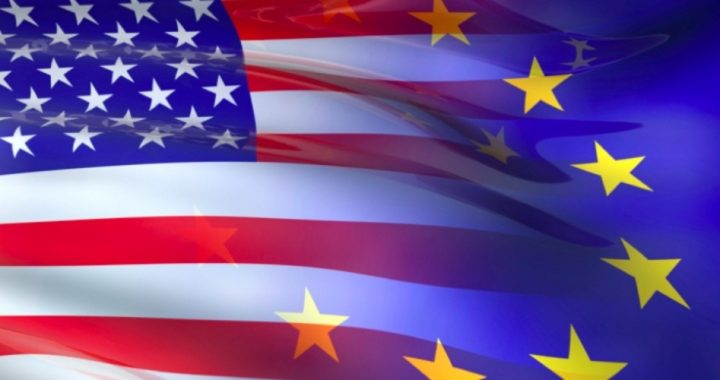
Negotiators in Washington, D.C. are working on a trade pact this week, and it isn’t the Trans-Pacific Partnership (TPP).
Representatives from the United States and the European Union are hammering out the details of a purported trade pact called the Transatlantic Trade and Investment Partnership (TTIP). Despite its name, this bundle of commercial compromises has little to do with trade and a lot to do with the slow transfer of sovereignty to bodies of globalists outside the United States.
Notably, the men and women chosen to enforce the myriad TTIP provisions will be unelected by the American people and consequently unaccountable to them. This is in direct violation of the Constitution’s grant of sole legislative power to the Congress of the United States.
On December 16, The New American was invited to participate in a telephone press conference discussing troubling details of the TTIP agreement.
To begin the conference, it was admitted that in the official document outlining the deal, the Obama administration has made clear that an agreement will not be chiefly focused on matters related to international trade, but rather “behind-the-border” (read: domestic) policies such as health, environmental, and monetary policy. As with so many of the other panoply of recent trade deals, multinational corporations operating within the United States and the EU are achieving quasi-governmental power and using that authority to limit the ability of U.S. and EU courts to enforce domestic laws, particularly those that the corporate interests deem detrimental to their bottom line.
During the press conference, several civil society groups from the United States and Europe briefed reporters on significant threats to individual liberty lurking within the TTIP.
Leaders with Public Citizen, Sierra Club, Consumer Federation of America, and Transatlantic Consumer Dialogue voiced concerns about the effects of the TTIP on consumer rights, privacy, communities, and the environment.
“U.S. and EU negotiators are clear that their purpose in negotiating [the TTIP] is to remove ‘regulatory barriers’ to trade,” said Robert Weissman, president of Public Citizen. “Big Business is clear about what this means; giant corporations hope to use [the TTIP] as a way to roll back or stall a vast swath of consumer and environmental regulatory protections in the United States and Europe — involving everything from food safety to privacy, consumer finance to chemical safety.”
Environmentalists expressed concern about the broad rights granted to corporations through the investment rules in the proposed trade pact. Sierra Club executive director Michael Brune revealed that his organization had sent a letter to U.S. Trade Representative Ambassador Michael Froman and European Union Trade Commissioner Karel De Gucht in the name of almost 200 likeminded organizations in Europe and the United States opposing a key provision of the TTIP that extends extraordinary power to corporations to invalidate domestic laws they consider contrary to their business interests.
“This pact could jeopardize critical safeguards necessary to protect our families, our communities, and our climate by giving corporations undue rights to use secret tribunals to challenge public interest laws that they disagree with,” said Brune. “As negotiators meet this week, they must keep in mind that governments exist for the benefit of people — not corporations — and keep these dangerous rules out of the pact.”
Consumer groups also called for trade negotiators to uphold and increase privacy rights for Americans and Europeans.
“At a time of increasing commercial and government surveillance of individuals, we need stronger privacy rights on both sides of the Atlantic, not a trade deal that would allow personal information to flow across borders and into private databases and government hands, without adequate constraints,” said Susan Grant, director of consumer protection at Consumer Federation of America. “A vibrant transatlantic marketplace will only be achieved if individuals can trust that their data will be collected and used appropriately, and both partners in these trade negotiations have a long way to go to gain that trust, especially the U.S.”
The participating consumer groups also called for strong protections on shared data, in order to promote the interests of consumers who will be affected by expanded trade.
“Free flow of information around the web is essential to ensure freedom of expression and consumer choice,” said Anna Fielder, senior policy advisor of Transatlantic Consumer Dialogue and chair of the board of Privacy International. “But this does not mean rules on free flows of personal information enforced through trade agreements, at a time when consumer trust is at its lowest due to massive and unwarranted government surveillance. We need speedy adoption of ongoing data protection reforms in the EU before any talk of common privacy standards can begin — and in any case, such standards should be developed outside the trade agreement.”
Although the regulation of the environment, the Internet, and food safety do not fall within the powers granted by the states to the federal government in the Constitution, the endowment of ultra-national bodies of bureaucrats with irrevocable power to rule in these arenas is equally unconstitutional and unwise.
Apart from reams of regulations promulgated by European apparatchiks, the real assault on liberty lurking in the TTIP is its acceleration of economic and, ultimately, political integration of the United States and the EU.
As The New American’s senior editor, William F. Jasper, wrote:
The architects and promoters of the TPP and FTAAP frequently point with admiration to the “integration” process of the European Union (EU) as the model they would like to see implemented for the Asia-Pacific rim nations. As with the Transatlantic Trade and Investment Partnership (TTIP), the Trans-Pacific Partnership has been designed to follow the EU example of relentless widening and deepening, constantly eroding national sovereignty, while building “transnational governance” that is not restrained by the checks and balances of national constitutions.
In an earlier article published in August by The New American, Jasper reported on some of the early indicators of the anti-American intent of the TTIP promoters:
On June 17, at the G8 Summit in Lough Erne, Ireland, President Obama joined British Prime Minister David Cameron and Messrs. Barroso and Van Rompuy to again pitch the jobs-and-prosperity promise in a press conference to boost the TTIP.
Van Rompuy gave a hint as to the deeper nature of the proposed EU-U.S. partnership.
“The positive ramifications will even go beyond the economy as such,” he said. “We are making our economies all over the world more interdependent.” For those familiar with globospeak, “interdependent” and “interdependence” are instantly recognized as favorite terms of one-world activists who abhor national independence and sovereignty. It is the basis of “The Project” — which is how EU insiders refer to their burgeoning superstate. Although it was originally sold to the public of the six original member nations merely as a coal and steel collective, the architects had planned from the beginning to keep “widening” (adding more member states) and “deepening” (usurping more and more national powers). The deepening process involves “integration” and “harmonization,” which means completely intertwining the economies, political structures, policies, laws and regulations, and bringing them all under the authority of the EU institutions.
Barroso provided another hint, stating that the TTIP is “a powerful demonstration of our determination to shape an open and rules-based world.” Yes, but many observers would point out that if we are to go by the “rules-based” model imposed on the EU by Barroso and his confreres, we are talking about arbitrary international rules that will be fashioned by faceless, unaccountable international rule-makers, and enforced by international bureaucrats, regulators, and tribunals.
U.S. and EU trade representatives will wrap up this round of TTIP negotiations on Friday, December 20.
With the conclusion last week of similar talks in Singapore concerning the imminent presentation of the still-secret Trans-Pacific Partnership pact, the integration of the United States with regional blocs in the Pacific and Atlantic is on pace and the ultimate surrender of sovereignty is rapidly marching over the horizon.
Joe A. Wolverton, II, J.D. is a correspondent for The New American and travels frequently nationwide speaking on topics of nullification, the NDAA, and the surveillance state. He is the host of The New American Review radio show that is simulcast on YouTube every Monday. Follow him on Twitter @TNAJoeWolverton and he can be reached at [email protected]



